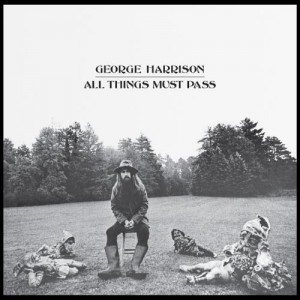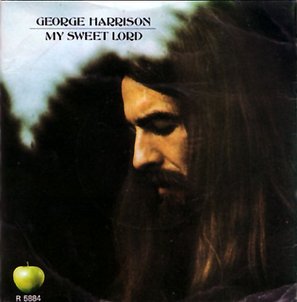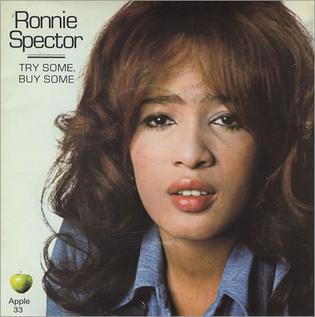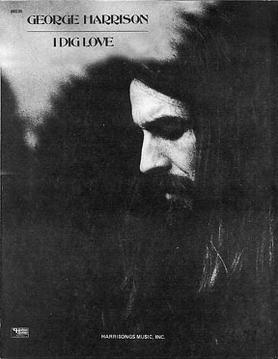Related Research Articles

All Things Must Pass is the third studio album by the English rock musician George Harrison. Released as a triple album in November 1970, it was Harrison's first solo work after the break-up of the Beatles in April that year. It includes the hit singles "My Sweet Lord" and "What Is Life", as well as songs such as "Isn't It a Pity" and the title track that had been overlooked for inclusion on releases by the Beatles. The album reflects the influence of Harrison's musical activities with artists such as Bob Dylan, the Band, Delaney & Bonnie and Friends and Billy Preston during 1968–70, and his growth as an artist beyond his supporting role to former bandmates John Lennon and Paul McCartney. All Things Must Pass introduced Harrison's signature slide guitar sound and the spiritual themes present throughout his subsequent solo work. The original vinyl release consisted of two LPs of songs and a third disc of informal jams titled Apple Jam. Several commentators interpret Barry Feinstein's album cover photo, showing Harrison surrounded by four garden gnomes, as a statement on his independence from the Beatles.

"My Sweet Lord" is a song by English musician George Harrison, released in November 1970 on his triple album All Things Must Pass. It was also released as a single, Harrison's first as a solo artist, and topped charts worldwide; it was the biggest-selling single of 1971 in the UK. In America and Britain, the song was the first number-one single by an ex-Beatle. Harrison originally gave the song to his fellow Apple Records artist Billy Preston to record; this version, which Harrison co-produced, appeared on Preston's Encouraging Words album in September 1970.
"All Things Must Pass" is a song by English rock musician George Harrison, issued in November 1970 as the title track to his triple album of the same name. Billy Preston released the song originally – as "All Things (Must) Pass" – on his Apple Records album Encouraging Words (1970) after the Beatles had rehearsed the song in January 1969 but did not include it on their Let It Be album. The composition reflects the influence of the Band's sound and communal music-making on Harrison, after he had spent time with the group in Woodstock, New York, in late 1968. In his lyrics, Harrison drew inspiration from Timothy Leary's poem "All Things Pass", a psychedelic adaptation of the Tao Te Ching.

"Try Some, Buy Some" is a song written by English rock musician George Harrison that was first released in April 1971 as a single by American singer Ronnie Spector, formerly the lead vocalist of the Ronettes. She recorded it in London along with other Harrison compositions for a planned comeback album on the Beatles' Apple record label. The project was co-produced by Phil Spector, Ronnie's husband at the time, but abandoned following recording sessions that were hampered by his erratic behaviour. The only official release from the sessions, the single achieved minimal commercial success, peaking at number 77 on the US Billboard Hot 100 and number 63 on Canada's RPM Top 100. Harrison later added his own vocal onto a new mix of the instrumental track and included the song on his 1973 album Living in the Material World.

"What Is Life" is a song by the English rock musician George Harrison from his 1970 triple album All Things Must Pass. In many countries, it was issued as the second single from the album, in February 1971, becoming a top-ten hit in the United States, Canada and elsewhere, and topping singles charts in Australia and Switzerland. In the United Kingdom, "What Is Life" appeared as the B-side to "My Sweet Lord", which was the best-selling single there of 1971. Harrison's backing musicians on the song include Eric Clapton and the entire Delaney & Bonnie and Friends band, with whom he had toured during the final months of the Beatles. Harrison co-produced the recording with Phil Spector, whose Wall of Sound production also employed a prominent string arrangement by John Barham and multiple acoustic rhythm guitars, played by Harrison's fellow Apple Records signings Badfinger.
"Beware of Darkness" is a song by English rock musician George Harrison from his 1970 triple album All Things Must Pass. It is the opening track on the second disc of the album. The lyrics warn against allowing illusion to get in the way of one's true purpose in life, an admonition that, like the content of "My Sweet Lord", reflects the influence of Harrison's association with the Radha Krishna Temple. Several critics recognise the song as one of the best tracks on All Things Must Pass.
"Who Can See It" is a song by English musician George Harrison, released on his 1973 album Living in the Material World. The lyrics reflect Harrison's uneasy feelings towards the Beatles' legacy, three years after the group's break-up, and serve as his statement of independence from expectations raised by the band's unprecedented popularity. Some music critics and biographers suggest that he wrote the song during a period of personal anguish, following the acclaim he had received as a solo artist with the 1970 triple album All Things Must Pass and his 1971–72 Bangladesh aid project. The revelatory nature of the lyrics has encouraged comparisons between Living in the Material World and John Lennon's primal therapy-inspired 1970 release, Plastic Ono Band.
John Barham is an English classical pianist, composer, arranger, producer and educator. He is best known for his orchestration of George Harrison albums such as All Things Must Pass (1970) and for his association with Indian sitar maestro Ravi Shankar.

"Wah-Wah" is a song by English rock musician George Harrison from his 1970 triple album All Things Must Pass. Harrison wrote the song following his temporary departure from the Beatles in January 1969, during the troubled Get Back sessions that resulted in their Let It Be album and film. The lyrics reflect his frustration with the atmosphere in the group at that time – namely, Paul McCartney's over-assertiveness and criticism of his guitar playing, John Lennon's lack of engagement with the project and dismissal of Harrison as a songwriter, and Yoko Ono's constant involvement in the band's activities. Music critics and biographers recognise the song as Harrison's statement of personal and artistic freedom from the Beatles. Its creation contrasted sharply with his rewarding collaborations outside the group in the months before the Get Back project, particularly with Bob Dylan and the Band in upstate New York.
"I Live for You" is a song by English rock musician George Harrison originally recorded during the sessions for his All Things Must Pass triple album in 1970. Long available on bootlegs, the song was finally released officially as a bonus track on the 30th anniversary reissue of All Things Must Pass in January 2001. The released recording features only Harrison's lead vocal and Pete Drake's prominent pedal-steel guitar from the 1970 album sessions, with all other instruments overdubbed by Harrison and his son Dhani in 2000. Despite the wealth of unreleased material recorded for All Things Must Pass, it was the only new song included with the album's 2001 reissue. Music critics recognise "I Live for You" as one of many George Harrison compositions that can be interpreted as both a traditional love song and a devotional song.
"I'd Have You Anytime" is a song written by George Harrison and Bob Dylan, released in 1970 as the opening track of Harrison's first post-Beatles solo album, All Things Must Pass. The pair wrote the song at Dylan's home in Bearsville, near Woodstock in upstate New York, in November 1968. Its creation occurred during a period when Harrison had outgrown his role in the Beatles and Dylan had withdrawn from the pressures of fame to raise a family. "I'd Have You Anytime" is recognised as a statement of friendship between the two musicians, whose meetings from 1964 onwards resulted in changes in musical direction for both Dylan and the Beatles. The song reflects the environment in which it was written, as Harrison's verses urge the shy and elusive Dylan to let down his guard, and the Dylan-composed choruses respond with a message of welcome.

"Ballad of Sir Frankie Crisp (Let It Roll)" is a song by English rock musician George Harrison from his 1970 triple album All Things Must Pass. Harrison wrote the song as a tribute to Frank Crisp, a nineteenth-century lawyer and the original owner of Friar Park – the Victorian Gothic residence in Henley-on-Thames, Oxfordshire, that Harrison purchased in early 1970. Commentators have likened the song to a cinematic journey through the grand house and the grounds of the estate.

"Run of the Mill" is a song by English musician George Harrison, released on his 1970 triple album All Things Must Pass. Harrison wrote the song shortly after the Beatles' troubled Get Back sessions in early 1969, during a period when his growth as a songwriter had inadvertently contributed to the dysfunction within the Beatles' group dynamic. It is commonly asserted that the lyrics reflect the toll that running their company Apple Corps had taken on relationships within the band, especially between Paul McCartney and the other three Beatles, as well as Harrison's dismay at John Lennon's emotional withdrawal from the band. Many commentators recognise "Run of the Mill" as one of several Harrison compositions that provide an insight into events behind the Beatles' break-up, particularly the difficulties surrounding Apple.
"Awaiting on You All" is a song by English musician George Harrison, released on his 1970 triple album, All Things Must Pass. Along with the single "My Sweet Lord", it is among the more overtly religious compositions on All Things Must Pass, and the recording typifies co-producer Phil Spector's influence on the album, due to his liberal use of reverberation and other Wall of Sound production techniques. Harrison recorded the track in London backed by musicians such as Eric Clapton, Bobby Whitlock, Klaus Voormann, Jim Gordon and Jim Price – many of whom he had toured with, as Delaney & Bonnie and Friends, in December 1969, while still officially a member of the Beatles. Musically, the composition reflects Harrison's embracing of the gospel music genre, following his production of fellow Apple Records artists Billy Preston and Doris Troy.
"Behind That Locked Door" is a song by English rock musician George Harrison from his 1970 triple album All Things Must Pass. Harrison wrote the song in August 1969 as a message of encouragement to Bob Dylan, who was making a highly publicised comeback to the concert stage, accompanied by the Band, with a headlining performance at the Isle of Wight Festival. "Behind That Locked Door" is a rare Harrison composition in the country music genre and the second song dealing with the friendship between himself and Dylan, after their 1968 collaboration "I'd Have You Anytime". Its lyrics address Dylan's elusive nature, and reflect the high regard in which Harrison held the American singer's work. The same reluctance on Dylan's part to re-engage with a concert audience led to him retreating again from live performance until August 1971, when he responded to Harrison's request to play at the Concert for Bangladesh.
"Let It Down" is a song by English musician George Harrison, released on his 1970 triple album All Things Must Pass. The recording was co-produced by Phil Spector and employs the latter's Wall of Sound production technique to lavish effect. Its brash opening and choruses contrast with the ethereal quality of the verses – a loud/soft approach that has been credited with influencing indie bands during the 1980s and 1990s.

"I Dig Love" is a song by English rock musician George Harrison from his 1970 triple album All Things Must Pass. A paean to free love, it marks a departure from the more profound, spiritually oriented subject matter of much of that album. Musically, the song reflects Harrison's early experimentation with slide guitar, a technique that he was introduced to while touring with Delaney & Bonnie and Friends in December 1969.

"Art of Dying" is a song by English rock musician George Harrison from his 1970 triple album All Things Must Pass. Harrison began writing the song in 1966 while still a member of the Beatles and during a period when he had first become enamoured with Hindu-aligned spirituality and other aspects of Indian culture. The subject matter is reincarnation and the need to avoid rebirth, by limiting actions and thoughts that lead to one's soul returning in another, earthbound life form.
"Hear Me Lord" is a song by English rock musician George Harrison from his 1970 triple album All Things Must Pass. It was the last track on side four of the original LP format and is generally viewed as the closing song on the album, disc three being the largely instrumental Apple Jam. Harrison wrote "Hear Me Lord" in January 1969 while still a member of the Beatles, who rehearsed it briefly at Twickenham Film Studios that month, but passed it over for inclusion on what became their final album, Let It Be.
"The Answer's at the End" is a song by English rock musician George Harrison, released in 1975 on his final album for Apple Records, Extra Texture . Part of the song lyrics came from a wall inscription at Harrison's nineteenth-century home, Friar Park, a legacy of the property's original owner, Sir Frank Crisp. This aphorism, beginning "Scan not a friend with a microscopic glass", had resonated with Harrison since he bought Friar Park in 1970, and it was a quote he often used when discussing his difficult relationship with his former Beatles bandmate Paul McCartney.
References
- ↑ Green, Stanley (April 30, 2009). Encyclopedia of the Musical Theatre. Da Capo Press. p. 218. ISBN 9780786746842 . Retrieved September 26, 2015.
- ↑ "The Online Discographical Project". 78discography.com. Retrieved February 26, 2018.
- ↑ "The Online Discographical Project". 78discography.com. Retrieved February 26, 2018.
- ↑ "Discogs.com". Discogs.com. Retrieved February 26, 2018.
- ↑ "Discogs.com". Discogs.com. Retrieved February 26, 2018.
- ↑ "Discogs.com". Discogs.com. 1981. Retrieved February 26, 2018.
- ↑ "Discogs.com". Discogs.com. Retrieved February 26, 2018.